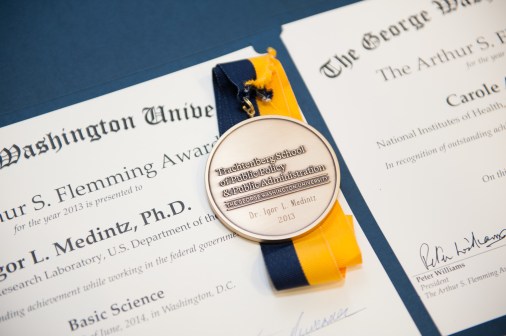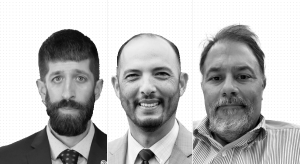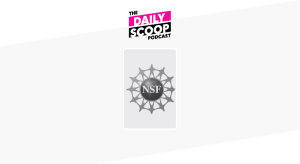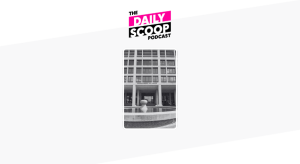“Up-and-coming” is a regular FedScoop feature profiling the rising stars in federal government. Nominate your favorite up-and-comer here.
 Jenn Gustetic
Jenn GusteticWho?
Jenn Gustetic (@jenngustetic)
Prizes and Challenges Program Executive
NASA
What inspires you to work for government?
Someone I respect in the civil service once told me “Humans are the only species on earth that have the capability to use what we know to impact the future. Thus, we have a profound responsibility to make better decisions today for future generations.”
Obviously, work towards this goal can be made both inside and outside of government, but having worked both in the government and the private sector. Up until this point in my career, I’ve found that I can help take more of an active role in making that impact on the government side. I came back to government this year for two reasons (1) to be a force for innovation from the inside and (2) to work for the agency that inspired me to study engineering and dream big from a young age: NASA.
I will stay because I get to work on inspiring problems every day. What’s not inspiring about getting to think about how to combine (1) making government more nimble and innovative (through prizes and other open innovation methods) with (2) “reaching for new heights and revealing the unknown so that what we do and learn will benefit all humankind”?
I have a cool job at a cutting-edge agency. That, in and of itself, is humbling and inspiring at the same time.
What does your typical day look like?
There is no typical day. The nature of my role at NASA (Prizes and Challenge Program Executive for the Office of the Chief Technologist) is to think about how prize competitions can help us solve some of our greatest problems in new ways, with additional people that don’t typically get to work with NASA. I’m leading this thinking from a strategic level at the agency, but I also get to roll up my sleeves think about specific prize competitions as well. Crafting effective prizes starts with having a well scoped problem statement so I get to work on a lot of issue areas and work with a lot of brilliant people to do that. One day I might be faced with understanding an earth science problem and the next it might be a human spaceflight problem. Every day, I facilitate problem development and prize design with the experts. Since no two problems are the same, no two processes or prizes are the same. I’m constantly learning and trying new approaches to engage the right people, at the right time, to solve the right problem. And I get to be strategic. It’s a pretty awesome place to sit.
What advice do you have for senior level executives to help them cultivate the next generation of public servants?
I think that one of the more difficult issues with developing talent within the government sits squarely in our ability to recruit talent. I love what Todd Park is doing with the Presidential Fellows Program to bring new, next generation talent into government for specific projects. However, this program will only touch 15 people, and we can do more. I can’t tell you how many people come to me every month asking for advice about the USAjobs application process. There are so many hurdles built into the way that the next generation of public servants GET their jobs in government, let alone how they are developed once they get there. To me, recruitment and incentives to retain talent have to be worked out in addition to the items senior level execs can do on their own (being open to new ideas, allowing employees to develop skills on details, thinking at the pace of technology and not at the pace of process/policy, etc.). There are many things senior level execs can do on their own, but we have to fix the recruitment and retention incentives SYSTEM which constrains these folks as well.
Do you have any mentors? If so, what role have they played in your career?
I don’t have any formal mentors but I have several people in a variety of networks that I look to for advice when I face different types of issues. To me, a mentor is someone you can go to for support and perspective when you’re facing a specific issue or a career development choice–it doesn’t have to be formal. However, I know other women my age have formal mentors and those have been very valuable to them. I’ve done what has worked for me–but there are many ways to approach mentoring. My mentoring system has included folks younger than me that I supervise, older than me that have relevant experiences/insight, professors, peers that deal with similar issues, and friends/family who know what makes me happy and have my best interest at heart. These networks have played a huge role in my career development–providing a compass in new fields/discipline when there is not a clear, true north. As innovators, many of us are creating “new norths,” so a support system down that undefined vector is critically important to keep us moving forward.
What’s your favorite DC hangout?
Depends on the day and time of year, and how you define “favorite” and “hangout” (the engineer in me speaking), but there are a few places you’ll find me. Guaranteed you’ll find me almost every Saturday in the fall at Pour House watching Gator football with the DC Gator Club (I bleed orange and blue). I also recently co-founded a new meetup group in DC for Design Thinking. We’re almost at 500 members and host about an event a month, so you’ll find me all over the city hosting events for that group as well. Other favorites include Nora’s for dinner, Poste for summer happy hour, anywhere for Karaoke, and many of the vineyards right outside DC (Breaux is a favorite). And I guess based on my love of reality TV to unwind, one of my tried and true hangouts is simply my couch with a glass of wine.
How do you unwind?
Cooking, spending QT (quality time) with friends, traveling back home and to new destinations, experiencing life with my wonderful boyfriend and watching an embarrassing amount of reality TV (yes Andy Cohen, I’m talking about your Bravo masterpieces…)
Nominate your favorite federal government up-and-comer here.






